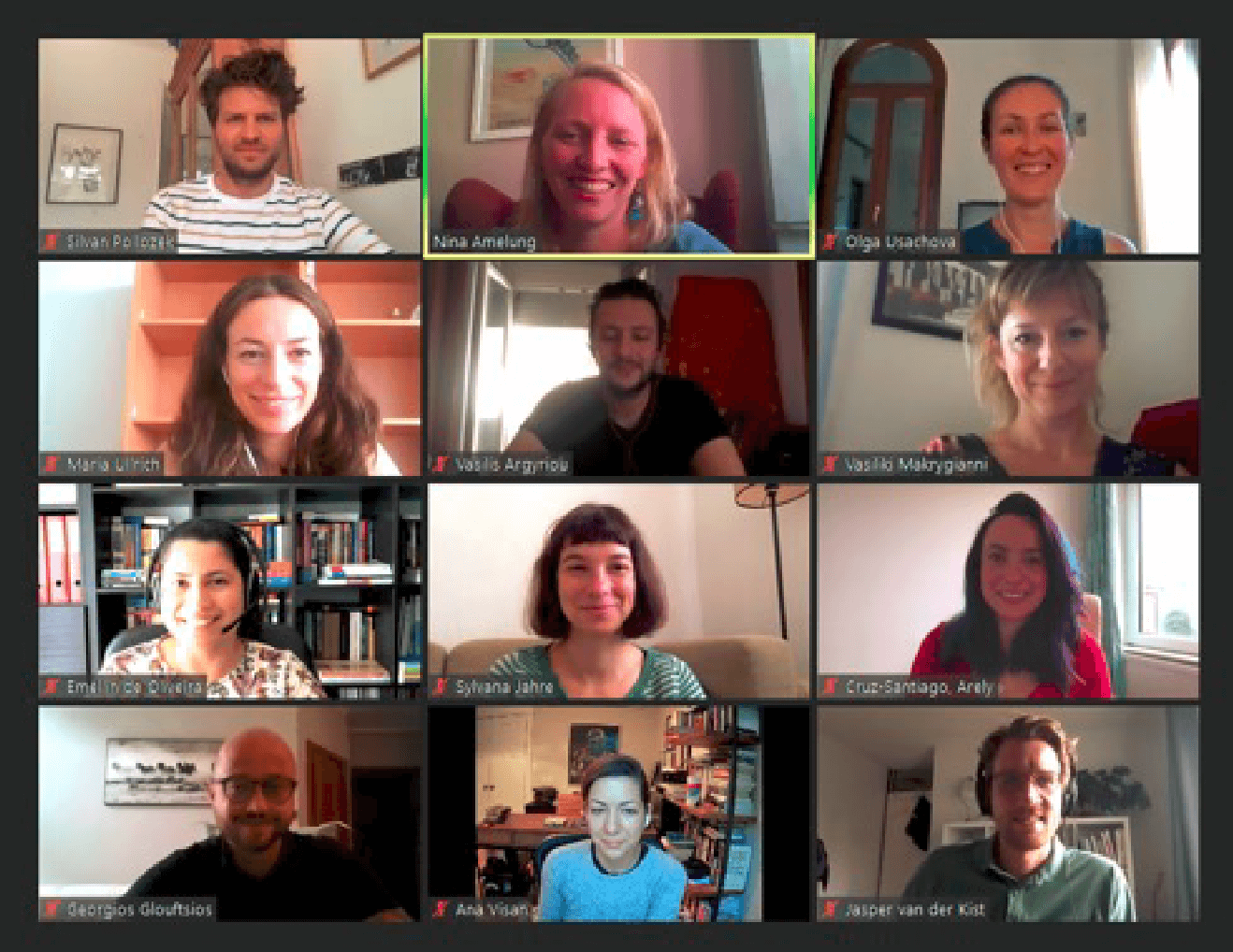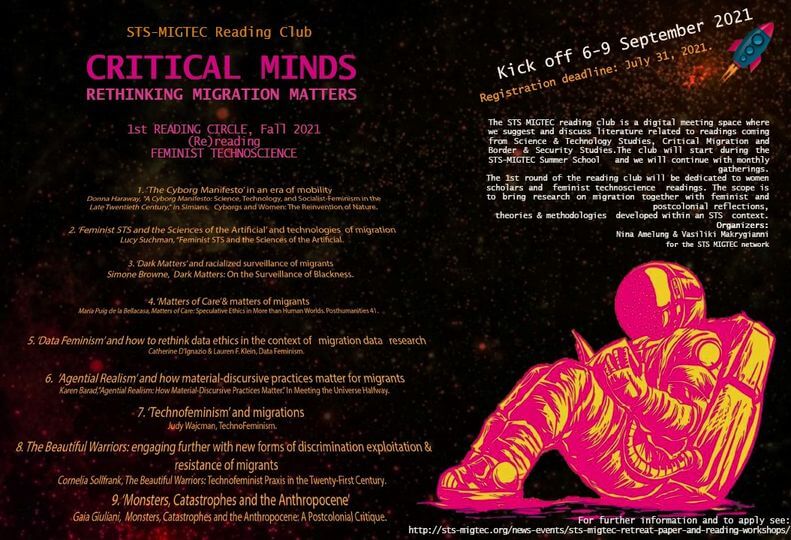A portrait of STS-MIGTEC: An independent network working on migration, technologies and borders
Silvan Pollozek, Jasper van der Kist, Paul Trauttmansdorff, Olga Usachova, Maria Ullrich, Vasiliki Makrygianni, Nina Amelung, Arely Cruz-SantiagoOctober 4, 2021 | Report-Backs
Migration, technology, and borders exist in a mutually constitutive relationship. The development and usage of technologies and infrastructures deeply transform border and migration regimes, including the very meaning of borders, the practices of surveillance and control, as well as the multiple forms of mobility. Technological practices, therefore, mediate and reconfigure migration and the right to move across borders.
The STS-MIGTEC network has aimed to create an independent collaborative space, where scholars around the world can foster an engaged, interdisciplinary community dedicated to exploring the complex entanglements of migration, technologies, and borders. It seeks to advance critical engagement and joint knowledge-production regarding the ways technologies and infrastructures reshape policies, regulations, imaginaries, and practices of control and surveillance, and what kind of struggles, subversions, and resistances they produce.
By bringing together people working at the intersection of fields including (but not limited to) science and technology studies (STS), critical borders and migration studies, and security studies, the network creates opportunities for researchers in various stages of their careers to connect and exchange with one another, to present ongoing work, and to discuss and reflect their interventions in the field. We created a platform that connects researchers from different disciplines, who cover different topics, matters, and initiatives related to borders and migration. In that sense, the specific vision for the network is providing a solidarity and support network to establish a culture of mutual care, collaboration, and producing synergies by organizing workshops, academic skill training, publications, and research projects.
A Brief History of the STS-MIGTEC Network
The idea for STS-MIGTEC sparked during the EASST conference in Lancaster in 2018. Silvan Pollozek and Nina Amelung discussed the idea of a research network that brings together scholars, activists, and other actors engaged with technologies and infrastructures of migration and border control. Our impression was that there was a trend of initiatives, research grants, conference panels and publication initiatives that laid the foundation for a vibrant interdisciplinary community.
After discussing the idea with several scholars, we decided to start small. We created a mailing list that allows colleagues to share calls for academic events, publications, and job opportunities, to invite people for collaborations and projects or to ask for feedback and test arguments and ideas. We later developed a website that informs about events, presents members and their projects and publications, creates a repository of relevant literature, and brings together interesting initiatives beyond academia. But it needed the support of Tim Schütz, Wouter Van Rossem, and Paul Trauttmansdorff until we could put this idea into practice. At the beginning of 2020, our first preliminary website went online.
In summer 2019, we launched the STS-MIGTEC network and invited colleagues to join the initiative, subscribe to the mailing list, and actively work on several projects. Step by step, more and more colleagues joined. By now, 159 members are subscribed to the mailing list and share calls, publications, and invitations for events related to STS-MIGTEC topics. Around 35 scholars are currently listed as members of the network on the website.
In September 2020, the network took a more institutionalized shape. A coordination committee was founded that regularly updates and discusses the development of the STS-MIGTEC network. As part of the committee three working groups were created with more than a dozen of colleagues who committed to actively participate in the coordination and organisation of the network (Nina Amelung and Silvan Pollozek as chairs, and Arely Cruz-Santiago, Vasilis Galis, Georgios Glouftsios, Fredy Mora-Gámez, Vasiliki Makrygianni, Tim Schütz, Paul Trauttmansdorff, Aristotle Tympas, Dimitri van den Meerssche, Jasper van der Kist, Maria Ullrich, Olga Usachova, Ana Visan, Matthias Wienroth). An outreach group gets into contact with individual and institutional actors in and beyond Europe, and in and beyond academia, and updates the mailing list and website. An events group organizes conferences, workshops, summer schools and other events; and a funding group that serves as an “incubator” to prepare joint proposals for internationally oriented research funding opportunities as well as funding to support network activities.
STS-MIGTEC Activities
Thanks to the joint efforts of our members, a lot of different activities have been implemented. In January 2021, our first STS-MIGTEC two-day conference called STS-MIGTEC Paper Workshop was organized. Around fifty scholars presented their work in several thematic and open panels, for instance on alternative infrastructures, politics of (non)-knowledge, or biometrics, and discussed questions of agency and alterings, materialities, and imaginaries. The next STS-MIGTEC conference will take place in February 2022. The call for papers is currently out and available here.
Both Jasper van der Kist and Georgios Glouftsios have been organizing the so-called STS-MIGTEC Circle since May 2020. These are online events that take place once per month in which we jointly reflect on work-in-progress contributions related to the themes of interest to STS-MIGTEC. The idea is to create a safe space for probing and experimenting with ideas, arguments, attempts of analysis, and sense-making of empirical material. Its intimate format allows for a maximum of fifteen participants that support colleagues of all career stages who would like to get constructive feedback on their work. The planning for the next series of Circle events can be found on the STS-MIGTEC website.
This September, Maria Ullrich, Vasiliki Makrygianni, Silvan Pollozek, Olga Usachova, Ana Visan, Vasilis Argyriou, and Nina Amelung organized a small summer school called STS-MIGTEC Retreat. It hosted a writing group that invited early-career scholars to discuss and develop further their drafts of research papers thanks to constructive peer-feedback, as well as a reading group that discussed literature of classic and contemporary readings coming from STS, critical migration, and border and security studies.
The STS-MIGTEC reading club ‘Critical Minds: Rethinking Migration Matters’ is a digital meeting space that started during the STS-MIGTEC Retreat (September 2021) and will continue with monthly meetings. The first round of the reading club is dedicated to women scholars. It touches upon feminist technoscience readings and postcolonial reflections, theories and methodologies that have been developed within an STS context. Organizers of the reading club are Nina Amelung and Vasiliki Makrygianni.

Image: MIGTEC Coordination Committee Meeting, 10 September 2021.

Next Steps
In the next few years, we seek to give the network a more solid basis by applying for research grants that provide funding for interdisciplinary research projects, network initiatives, conferences, and workshops. The funding working group is already working on this. Also, despite some efforts in the last year, there is an overrepresentation amongst network members from Europe and North America. Therefore, we will even more intensively reach out to individual and institutional actors beyond Europe. Finally, we aim to realize more initiatives and collaborations with civic and activist actors beyond academia and think about forms of civic engagement the network could support and foster.
If you are interested in subscribing to the mailing list or becoming a member of STS-MIGTEC, please go to our website. In case you would like to actively participate in the network by joining the Coordination Committee, one of the working groups, or the events (conference, circle, summer school, reading group), we are looking forward to your message via migtec.website@gmail.com.
Silvan Pollozek (@Pollozek) is a scientific employee at the chair of Sociology of Technology at the European New School of Digital Studies (ENS). After studying cultural studies, sociology and gender studies, Silvan was a PhD candidate at the Munich Center for Technology in Society at the Technical University of Munich. Based on ethnographic research Silvan focuses on technologies of migration and border control, on the techno-politics of bureaucratic reordering, on the co-production of information infrastructures and European polities, as well as on flat methodologies and methods of vast socio-technical networks. While his PhD project examined data infrastructures of Frontex operations, his current project explores the mundane design and implementation practices of AI technologies in migration and asylum administration.
Jasper van der Kist (@jaspervdkist) is a PhD candidate in politics at the University of Manchester. His current research project examines the role of country of origin information (COI) in European asylum systems. He works at the intersection of critical migration studies, governmentality studies and science and technology studies. His work has been published in International Political Sociology and Citizenship Studies.
Paul Trauttmansdorff (@paul_trautt) is a PhD researcher at the Department of Science & Technology Studies of the University of Vienna. His dissertation project explores the entanglements of imaginations of future borders and promises of security with the construction and maintenance of large-scale digital infrastructures in the European Union. Paul has been a doctoral fellow of the Austrian Academy of Sciences and is currently a guest researcher at the Department of Philosophy and Communication Studies at the University of Bologna.
Olga Usachova (@taollinna) is a PhD student in Social Sciences, Interactions, Communication, Cultural Constructions, Department of Philosophy, Sociology, Education and Applied Psychology (FISPPA), University of Padua, Italy. She is a part of PaSTiS research group. Her PhD research project focuses on the socio-technical assemblage of digital technology used by and designed for refugees’ inclusion into the host society. Her research interests lie in the intersection of STS and migration/refugee studies.
Maria Ullrich has studied European studies and political science at the universities of Passau, Bonn and Naples. Her research interests lie at the intersection of refugee studies, citizenship studies and science and technology studies. She is a research associate at the Department for Political Sciences and Sociology at the University of Bonn and PhD candidate at the University of Siegen. In her doctoral thesis, Maria explores negotiation processes in and around civic participation of refugees in invited spaces in Germany.
Vasiliki Makrygianni has a background in architecture and urban planning (AUTh). Her doctoral thesis focused on emancipatory spatial practices of migrants in the Athenian city center. In her research she has examined migrants’ engagement with Information and Communications Technologies (ICTs) in order to navigate, cross borders and settle down in their trip to Europe. Her primary research areas include critical urban theory, feminist methodologies and migration studies. Current research interests focus on Science and Technology Studies (STS), digital space and feminist technoscience.
Nina Amelung (@nina_amelung) is sociologist and research fellow at Instituto de Ciências Sociais, Universidade de Lisboa, Portugal. She obtained her PhD in Sociology from the Technical University of Berlin. Her research interests lie at the intersection of Sociology of Culture, Science and Technology Studies and Critical Migration, Border and Surveillance Studies. In her current project entitled “Affected (non)publics: Social and political implications of transnational biometric databases in migration and crime control (AFFECT)” funded by Fundação para a Ciência e a Tecnologia (FCT) Nina explores the social and political implications of growing database infrastructures – in particular their design, governance and implementation – on understanding affected publics.
Arely Cruz-Santiago (@arycruzant) is a Leverhulme Trust Early Career Fellow within the Sociology, Philosophy and Anthropology Department at the University of Exeter, United Kingdom. Her fellowship Forensic Citizenship: Science and expertise in Latin America examines the development and governance of forensic grassroots practices that have emerged in Argentina and Colombia in the aftermath of human rights violations. Since 2011 Arely’s research has examined citizen-led practices of forensics such as the collection of DNA data, the analysis of victims’ records, the use of maps, GPS, CCTV images and drones to search for disappeared persons. Her research has been opening up a new agenda on citizen forensics that analyses emerging forms of citizenship built around Forensic Science and DNA in contexts of protracted conflict.
Published: 10/04/2021
